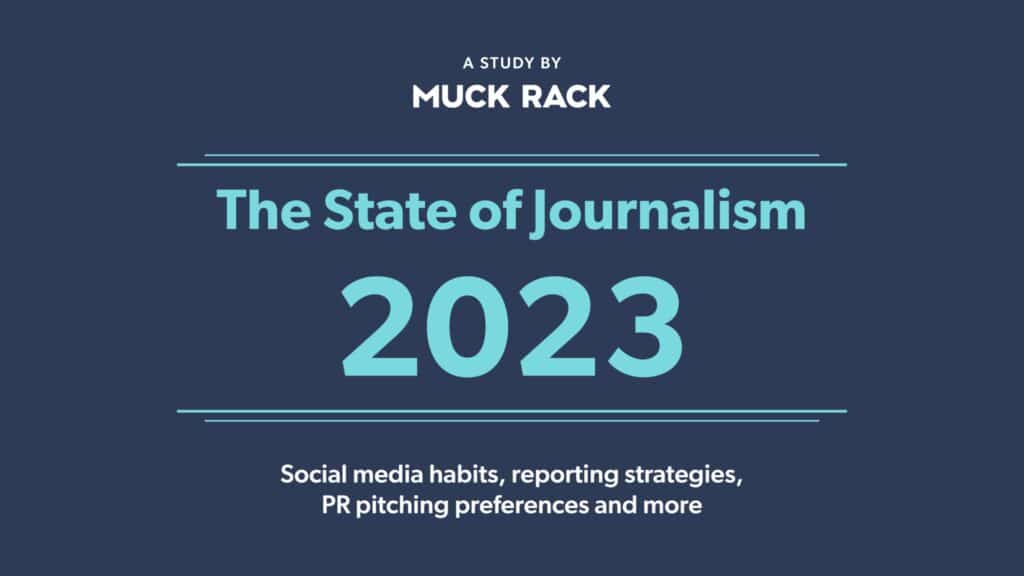For its newly released “The State of Journalism in 2023” study, Muck Rack surveyed more than 2,200 journalists to understand the current state of journalism and the future of the industry. The 45-page report provides a comprehensive overview of the current state of journalism, highlighting key trends and challenges – covering a wide range of topics from social media habits, PR pitching preferences and reporting strategies, to the impact of economic uncertainty and other top concerns.
While this sixth annual edition of Muck Rack’s State of Journalism report is oozing with interesting tidbits, here are some of the key takeaways we found most insightful.
-
- Social Media Habits – Twitter continues to be the most used social platform for journalists, with 90% using the platform to follow news, promote their own work, or find sources (in fact, most journalists consult a company’s social media in their reporting as well). While about half said they’ve considered leaving Twitter in their responses for the 2023 report, only 28% revealed they’re planning to spend less time on the social network this year.
At the same time, almost half of journalists believe short-form video will grow in popularity in 2023 – followed by podcasts (25%), and newsletters (13%) – so it’s no surprise that more journalists are also planning to spend more time on Youtube, Linkedin and TikTok. Snapchat and Facebook are the only platforms of note that journalists seem to be moving away from.
-
- Pitching Preferences and Reporting Strategies – Journalists continue to be busier than ever, with each covering an average of four beats these days. One in five journalists receive upwards of 50 pitches per week, and nearly half (47%) create more than five stories on a weekly basis. While most journalists haven’t changed their habits, another 7% say they’re more likely to respond to pitches now compared to last year. And 69% say pitches that connect to a trending story are the most shareable.
Still, many journalists lament the lack of relevant pitches. This may sound like a no-brainer, but year after year Muck Rack reports hearing the same thing: pitches get rejected if they aren’t personalized or come at a bad time. The top reason for pitch rejection (24%) continues to be lack of personalization, followed by bad timing (22%). According to the survey, preferred pitches are: 1) Sent via 1:1 email before noon and 300 words or less, 2) offered as an exclusive or connected to a trending story, and 3) followed up on within 3-7 days.
-
- Impact of Economic Uncertainty and Other Top Concerns – Half of journalists cited disinformation and lack of funding as top concerns for the industry right now, followed by trust in journalism (40%) and lack of time to cover stories thoughtfully (33%). Furthermore, recent layoffs and furloughs have increased the workload for about 20% of journalists, and one in five have switched jobs or made a career change due to the economy. And while two out of three journalists say their work has been impacted by economic uncertainty and 51% make $70,000 or less a year, more than half are optimistic about the profession.
As PR professionals, it’s important to stay informed about the latest trends and challenges in the industry, and to communicate these insights to our clients. Insights around pitch intelligence are one way we can make better-informed decisions in our practice – but at the end of the day, PR is really about personal relationships. Data like this contributes to our success when working with the journalism community because it helps to inform how we approach these relationships with empathy, patience and real insight into how journalism gets made.
The journalists we work with – to tell our clients’ stories, secure coverage, and inform readers – are real people, not algorithms. We we will always need to rely on experience (supported by data) to ensure success for the companies we serve. By doing so, we can better help them navigate the complex media landscape and develop effective PR strategies that resonate with their target audiences – now, and going forward.
Want to do more with your PR budget and generate world-class results? Let’s chat.

